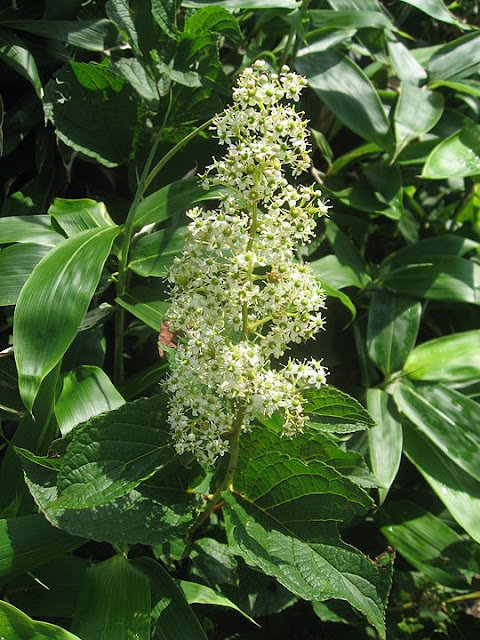Being
an Endocrinologist, this article drew my attention. Using a naturally available
product these scientists were able to make Leptin more sensitive (Leptin is
considered the hunger hormone)
Highlights
- Celastrol is a
natural compound extracted from thunder god vine
- Celastrol
creates similar expression profile to those of reduced ER stress
conditions
- Celastrol is a
powerful Leptin sensitizer
- Celastrol has potential as an anti-obesity therapeutic agent
·
The researchers were able
to prove that Celastrol activates specific satiety centers in the brain, which
play a key role in controlling body weight. Katrin Pfuhlmann, PhD student and
first author of the study, explains the effect: "Celastrol reactivates the
body's own mechanisms for controlling weight that would otherwise be switched
off in obese individuals. Normally those affected lose that feeling of fullness
because the respective hormone - Leptin - no longer has any effect. Celastrol,
the compound we examined, restores Leptin sensitivity and thus the sense of
satiety."
·
Also found in this 2017 study
Mesangial cells-mediated
glomerulonephritis is a frequent cause of end-stage renal disease. Here, we
show that Celastrol is effective in treating both reversible and irreversible
mesangioproliferative glomerulonephritis in rat models, but find that its
off-target distributions cause severe systemic toxicity. We thus target Celastrol
to mesangial cells using albumin nanoparticles. Celastrol-albumin nanoparticles
crosses fenestrated endothelium and accumulates in mesangial cells, alleviating
proteinuria, inflammation, glomerular hypercellularity, and excessive
extracellular matrix deposition in rat anti-Thy1.1 nephritis models.
Celastrol-albumin nanoparticles presents lower drug accumulation than free Celastrol
in off-target organs and tissues, thereby minimizing Celastrol-related systemic
toxicity. Celastrol-albumin nanoparticles thus represents a promising treatment
option for mesangioproliferative glomerulonephritis and similar glomerular
diseases.
EFFECTIVE IN AUTOIMMUNE DISEAES AS WELL
Celastrol is a bioactive compound derived
from traditional Chinese medicinal herbs of the Celastraceae family. Celastrol
is known to possess anti-inflammatory and anti-oxidant activities. Our studies
have highlighted the immunomodulatory attributes of Celastrol in
adjuvant-induced arthritis (AA), an experimental model of human rheumatoid
arthritis (RA). RA is an autoimmune disease characterized by chronic inflammation
of the synovial lining of the joints, leading eventually to tissue damage and
deformities. Identification of the molecular targets of Celastrol such as the
NF-κB pathway, MAPK pathway, JAK/STAT pathway and RANKL/OPG
pathway has unraveled its strategic checkpoints in controlling arthritic
inflammation and tissue damage in AA. The pathological events that are targeted
and rectified by Celastrol include increased production of pro-inflammatory
cytokines; an imbalance between pathogenic T helper 17 and regulatory T cells;
enhanced production of chemokines coupled with increased migration of immune
cells into the joints; and increased release of mediators of osteoclastic bone
damage. Accordingly, Celastrol is a promising candidate for further testing in
the clinic for RA therapy. Furthermore, the results of other preclinical
studies suggest that Celastrol might also be beneficial for the treatment of a
few other autoimmune diseases besides arthritis.
All these information is available for
scientists but why are we not hearing about it more often? Where can we find Celastrol
in nature? Are the drug companies interested in this?
Perhaps the following reason:
It is a very highly toxic plant but as seen
in another article about there is now technology of nano particles that
combines molecules of Celastrol to albumin.
The natural product is already available in
pharmacies in China despite the warning from Chinese Government for people not
to take them and you can buy them on line on Alibaba.
Drug companies have a history of creating
diseases with the help of professor-pawns; the Cholesterol story and the
Metabolic Syndrome are some great examples.
Just this past week, both Fish Oil
supplementation and Aspirin were found to be ineffective in the prevention of
cardiovascular disease.
This week along FDA has put warnings on two
medications that I read about. It instructed the makers of Estrogel to tone
down their false claims and told makers of sugar absorption blocking drugs in
the Kidneys (-flozins) to put a warning on their packets about a serious
genital infection in patients taking them.
We will wait for the next saga on Celastrol..






